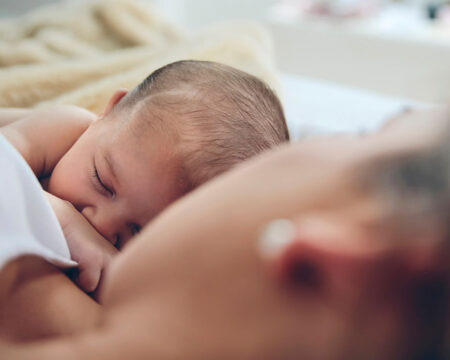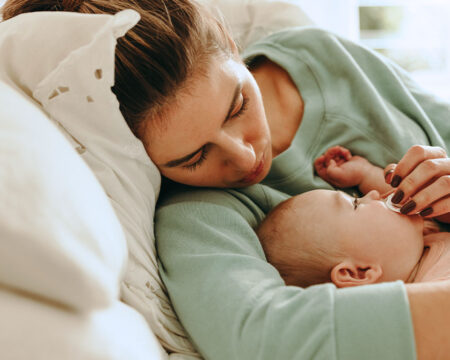Wondering if your baby will ever sleep on a regular schedule? They will—and here’s how you can help
This sets up a lifetime of healthy sleep habits.

@senkonelly via Twenty20
When you’re expecting a baby, you can also expect that you’ll lose some sleep in the coming weeks, months and even years. But how much sleep lost is too much? Although the answer will vary from family to family, the best thing you can do is aim to find a natural sleeping approach to helping babies sleep—and parents, too.
“With a new baby, it can feel like all you’re thinking about is sleep—usually what you’re not getting,” says Rachel Mitchell, a certified Infant and Toddler Sleep Specialist as well as the founder of My Sweet Sleeper. “In the first few months of life, babies have their days and nights mixed up, so sleep tends to be disorganized and unpredictable. And while this is developmentally normal for infants, this is part of the reason that many new parents experience sleep deprivation on some level in the newborn stage.”
While wading through these wakeful nights, it’s natural to have questions about newborn sleep patterns and how you can direct them toward a regular sleep schedule. That’s where we come in! Here are answers to some of the most frequently asked questions about newborn sleep.
How much sleep do newborns need?
The short answer: A lot—but their needs also evolve pretty rapidly in the first few weeks and months. For example, a one-week-old baby should get 14 to 17 hours of sleep during a 24-hour period that’s broken up into about 4.5 to 6.5 hours of daytime sleep and 10 to 12 hours of night sleep—accounting for wake-ups to feed.
By four months, babies should be sleeping 12 to 16 hours during a 24-hour period. The night sleep total should be about the same as when they were first born, but less frequent naps during the day bring the overall total amount of shut-eye down.
To help parents keep up with the evolving suggested sleep amounts, we break it down week-by-week and month-by-month here.
Will my baby ever learn to sleep on a regular schedule?
When your baby is waking up 10 minutes after you finally got them down to sleep, it can be hard to imagine there will be a day when their sleep schedule is consistent and predictable. It can and will happen, though, especially if you focus on building a good sleep foundation from the beginning.
Rachel explains four areas to pay attention to from the beginning are…
- Sleep environment
- Nutrition
- Routine
- Awake windows
What is sleep training?
There is a lot of buzz around the topic of sleep training, but also a lot of misconceptions. According to Rachel, “Sleep training is a concept that helps teach babies how to sleep independently so that you, as their parent, don’t need to be a part of the equation every time they rouse from sleep during naps or throughout the night.”
Although this can sound appealing to sleep-deprived new parents, Rachel recommends to hold off on any real sleep training attempts until your baby is at least four months old. She adds you may be able to tell if your baby is ready for gentle sleep training if you have time and energy to commit to the process and have already established a healthy sleep foundation.
Some sleep training methods are more involved than others, which is why it’s important to find an approach that works for you and your baby.
Beyond straight-up answering questions, we believed there should be a better way to teach and talk about newborn sleep. And that’s why we created the on-demand, online Navigating Newborn Sleep course.
The truth is that prioritizing sleep is good for every member of the family—including the littlest ones who somehow manage to both clock a lot of snoozing hours and keep parents awake a lot at night.
“Teaching your baby healthy sleep habits doesn’t have to start when they’ve reached a certain age or milestone,” Rachel says. “Although each developmental stage will have different sleeping habits and patterns, introducing healthy sleep hygiene from the start is a great way to ensure long-term sleep health.”
Led by Rachel, Navigating Newborn Sleep doesn’t promise a quick fix or sleep-training program. Instead, it will help you foster a lifetime of healthy, sustainable sleep practices. This includes eight video lessons that cover everything from getting through “survival mode” to establishing a routine and introducing self-soothing techniques.
Filled with information, powerful sleep tools and support for parents and babies, Navigating Newborn Sleep will build a strong foundation throughout the class.
Especially for new parents, knowledge, support and confidence are such gifts—and that’s what Navigating Newborn Sleep provides. As Rachel says, “We are going to give you the tools to deal with wake-ups and other challenges that arise during the newborn stage so that you feel better prepared and equipped.”
Learn more and enroll or share Navigating Newborn Sleep as a gift to another parent. You’ve got this, mama!



